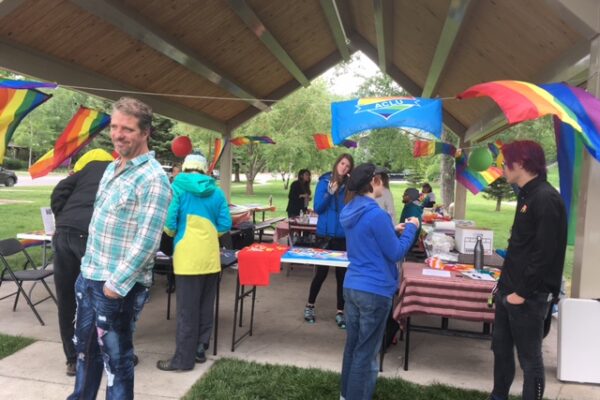By Sabrina King, Policy Director
Throughout the month of June, in communities across Wyoming, people got together for a picnic.
While a simple summer picnic might seem quaint and mostly inconsequential, these picnics were not the usual hot dog grill-out. Some of them were the first in their town, like Pinedale or Laramie. Others, like Jackson, have been doing this for a few years now. These weren’t just any picnics – they were Pride Picnics.
Wyoming isn’t like other states when it comes to Pride (or when it comes to most things, for that matter). We don’t have a major population center where a gigantic, well-heeled parade rolls down the street with music blaring and floats sporting every shade of rainbow. We don’t have the decades-long history of Pride celebrations, of rebellion and protest, of corporate takeovers, and again of rebellion and protest. Pride is a little bit quieter here – but no less proud.
Queer folks gathered on a hot Thursday night in Casper to watch Priscilla, Queen of the Desert, and celebrate a loving portrayal of drag queens and families. In Jackson, a potluck picnic brought out everyone from the shy high schooler just coming into their own to the mayor. In Laramie, the town’s first ever Pride celebration meant both a picnic and a vigil; in memory of Laramie’s own struggle with acceptance, and in celebration of how far we’ve come since then.
Rock Springs, Lander, Gillette, Cheyenne: all small. All funded and backed by local community. All proud.
Truthfully, being LGBTQ-Two Spirit in rural places can still be uniquely hard. Finding community is difficult; finding acceptance can still be impossible. In Wyoming, the “you can be whatever you want but just don’t shove it in my face” mentality still pervades public discourse. Policy makers still introduce legislation trying to legalize discrimination against the community. Some faith leaders – though not all – still write editorials against comprehensive nondiscrimination ordinances in towns where no protections exist in housing, or work, or even for just sitting down in a restaurant for a date.
When the “don’t shove it in my face” mentality rears its ugly head, allies across the state don tutus and put on a party. When lawmakers introduce hateful legislation, the chorus of support for the LGBTQ-Two Spirit population is so loud, and so deep, and so loving, the legislation dies with a whimper. And when one faith leader steps up against nondiscrimination, five others step up to speak out for their faith in love for all people.
Being queer in rural places can be hard. But being queer in rural places also means our ties to each other are that much more urgent, that much more present, that much more based in community and connection than in sponsorship and splash.
And it all starts at a seemingly quaint and inconsequential picnic in June.

